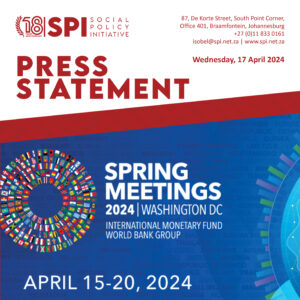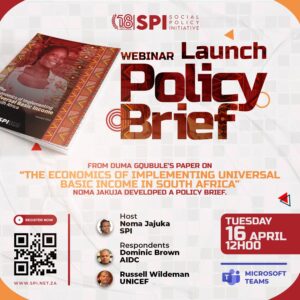A basic income grant is urgent if we are to avoid the next social explosion that destroys our common humanity
The following is an Op-ed by Isobel Frye on how a basic income grant will be beneficial to the labour force as well as the women of our nation:
One of the reasons given by the July looters for their actions was the total withdrawal of the R350 monthly Social Relief of Distress grant paid by the state. Although R350 is not enough to meet any standard of humanitarian adequacy levels on global measures, it made people feel included, seen and respected.
Isobel Frye is Director of the Studies in Poverty and Inequality Institute, SPII, an independent research think tank.
In the past 12 months, we have seen a staggering increase of almost 78% in the official unemployment rate in South Africa. The total number of jobless people is now 11.1 million adults. The number of people now not employed in South Africa begs the question: what exactly are our leaders waiting for before they adopt a basic income grant (BIG)?
Second-quarter 2021 unemployment figures were released by Stats SA on 24 August. The figures are chilling, but the visceral sense of what it means to be poor, unemployed, hungry and hopeless was starkly evident in the levels of rage seen in the July violence.
The rise in unemployment has been constant. This is not an unknown or sudden thing. In January 2008, the expanded unemployment rate for people aged 15 to 24 (this includes people who have given up looking for work, known as “discouraged work seekers”) was 56.4%, or two million young people. That rate has progressively increased over the years to 74.8%, or 2.4 million young people. But the solution is not in creating another youth employment programme, because unemployment stalks all ages just as starkly.
While 2.4 million youth are unemployed, a further 4.6 million people between the ages of 25 and 34 are unemployed. Just under three million people aged 35 to 44 are unemployed, and just over one million people aged 45 to 54 are unemployed. And for the majority of the jobless, unemployment is not transitory. In fact, 76.5% of the unemployed (six million people), have been without work for more than a year. A further 3.3 million people have given up looking for work entirely — these “discouraged work seekers” are defined as “neither employed nor unemployed”.
And black African women are the most starkly affected by unemployment.
One of the reasons given by the July looters for their actions was the total withdrawal of the R350 monthly Social Relief of Distress (SRoD) grant paid by the state in recognition of the poverty and hunger levels in South Africa since April 2020. Although R350 is not enough to meet any standard of humanitarian adequacy levels on global measures, it made people feel included, seen and respected.
It is difficult not to draw a link between the shocking images of the violence and looting and the state’s rapid reintroduction of the R350 SRoD grant this month. In truth, the Department of Social Development had been in ongoing battles for months with a hostile National Treasury to have the SRoD extended and upgraded, but had appeared to have lost the battle. The many research accounts of the SRoD grant support the global evidence about how successful a BIG can be in stimulating social and economic recovery.
Many researchers, including the Studies in Poverty and Inequality Institute, have demonstrated exactly how a decent universal monthly income grant, calculated for greatest impact at R1,268 per person per month, is affordable. It is doable in terms of affordability, it is desirable in terms of meeting people’s basic needs, and it would provide a dedicated stimulus to build the shrinking economies that make up most of the country.
So, to the government policymakers and journalists who dismiss the arguments for the urgent adoption of a universal R1,268 basic income grant, we have to ask: what is it that you are actually waiting for? What token of despair do you want to see burnt before you recognise that the structural crisis we face as a country is not an episodic blimp. It is a structural cancer that has eaten away so much of our social fabric that we must rebuild an edifice from the foundation up.
A BIG is big because it has to be. Small is not big enough to reconstruct the links between production and distribution and demand, between rural provinces and city migrants, between stomach and table and heart and future hope.
The prevalence of our unemployment demands three clear policy responses.
First, we need to introduce a universal decent basic income grant of R1,268. That will put food on the table. It will grow township economies into thriving hubs of diversified businesses, bridging the divide between formal and informal and CBD and peripheries, between, for example, Mount Frere and Durban.
Second, we need to build micro-policies that build programmes around business skills, from pricing goods to bulk buying, so that we prepare people to harvest the bulk demand that will be flowing from the BIG.
And third, the state needs to use the power of this monthly inflow investment into our communities to negotiate better — better banking fees for BIG accounts, better prices of basic foodstuffs: in short, to stretch the R1,268 per person per month further than the denominated rand for better value.
So, what are our leaders waiting for? The next cycle of social implosion or explosion that destroys our common humanity just that little bit more? The answer has been raised time and again — it is affordable, it is doable and it is just.
Which side of history do you want to be on?
Source: The Daily Maverick


